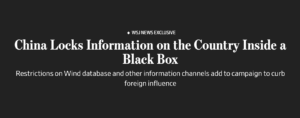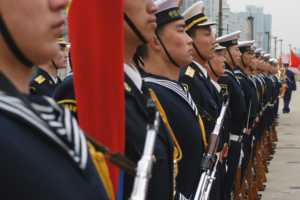Warfare as we know it has changed forever as the world becomes more connected.
The key driver for this change is the “Re-Rise of Great Power Competition” between nation-states such as the United States, the European Union, the United Kingdom, Russia, and China, which is governed by the Chinese Communist Party, (CCP).
The extent of the possible risks to companies
U.S. Secretary of State Mike Pompeo recently addressed the threats and existential risk to companies associated with Great Power Competition during a keynote presentation at the CERAWeek 2019, on March 12, 2019, in Houston, Texas.
Pompeo’s message highlighted economic rivalry and competition for global energy markets between the United States, Russia, and China during his keynote address where he had the following to say:
“The more we could spread the United States model of free enterprise, of the rule of law, of diversity, stability, transparency in transactions, the more successful the United States will be, the more successful and secure the American people will be… our model matters now, frankly, more than ever in an era of (…) great Power Rivalry and Competition” where some nations are using their energy for maligned purposes…,” said Mike Pompeo, U.S. Secretary of State.
Oil price, an alternate form of warfare
At present, a year later, we see Russia lowering oil prices during the global CCP coronavirus (COVID-19) pandemic outbreak, creating a price war between OPEC and Russia and sending oil prices plummeting as the demand for oil drops because people are ordered by their governments to shelter-in-place due to the virus.
Russia dropping their oil prices during a global pandemic is a great example of what Mr. Pompeo was speaking about, pertaining to the Great Power Competition.
It is clear that Russian Prime Minister Vladimir Putin is using Russia’s oil as a weapon of an alternative form of warfare known as “Hybrid Warfare.” The modern battlefield is everywhere rather than centered on a traditional battlefield where two mechanized armies engage in war.

We have seen the Great Power Competition before. This is not the first competition for resources such as oil. The last one led to the United States’ entry into World War II. Back then, the U.S. embargoed oil, keeping Japan from fueling their invasion of China prior to the bombing of Pearl Harbor on Dec. 7, 1941.
‘Hybrid Warfare’: The modern battlefield is everywhere
Hybrid Warfare simply means that the modern battlefield is everywhere, not just on the battlefield between “organic soldiers.”
The new targets of Hybrid Warefare include companies, governments, armed forces, and even civilians, including adults, teens, children, doctors, lawyers, judges, govt. officials, artists, entertainers, and business professionals.
Was Hybrid Warfare already mentioned by Sun Tzu more than 2,000 years ago?
If you never heard of Hybrid Warfare, you may not have read The Art of War by Sun Tzu, the famous Chinese military strategist from the 5th century B.C.
Hybrid Warfare is not a new concept but a rebranding of The Art of War by Sun Tzu in my opinion. See the following quote by Sun Tzu, for example:
“The supreme art of war is to subdue the enemy without fighting…The greatest victory is that which requires no battle”– Sun Tzu, The Art of War
Casey Fleming, Chairman, and CEO of BlackOps Partners, a think tank, intelligence, and security strategy firm in Washington, D.C., gives his definition of Hybrid Warfare as it relates to threats against Western multi-national corporations who compete against nation state-controlled corporations from adversarial countries such as China and Russia.
“Achieving military and political objectives by attacking everything short of conventional military methods. Today, companies and their innovation and IP are on the frontlines in the gray zone between peace and war. Adversaries like the Chinese Communist Party are well down the path of replacing many companies and globally dominating industries and sectors.” — Casey Fleming, BLACKOPS Partners, Washington, D.C.
Fleming’s review of Hybrid Warfare is highly relevant to Secretary of State Mike Pompeo’s views on the Great Power Competition between U.S. energy producers and energy producers from China and Russia, which validates that Russia is currently using their oil as a weapon during a global pandemic today.
Putin’s use of oil as a weapon during a global crisis such as a pandemic outbreak is a strategy right out of The Art of War.
‘Hybrid Warfare’: Some examples of risks to national and economic security
Hybrid Warfare presents a top existential risk to the national security and the economy of Western allies, such as the U.S., UK, and the EU, due to the fact that Western countries are reliant on China, an adversary, for the bulk of their supply chains associated with the manufacturing of vital products, medicine, electronics, and technology.
“Know your enemy and know yourself and you will always be victorious.” — Sun Tzu, The Art of War
Providing college educations to Chinese nationals while doing business with your adversary, 100 percent controlled by the CCP, has grave consequences as the United States is finding out during the CCP coronavirus pandemic.
For example, the fact that the U.S. government, over the years, has made it profitable for U.S. corporations to outsource the manufacturing of many vital goods and services to China gives the leader of the People’s Republic of China, XI Jinping, leverage over U.S. manufacturers and the government when it comes to negotiations.
“When you surround an army, leave an outlet free. Do not press a desperate foe too hard.” — Sun Tzu, The Art of War
In a worst-case scenario, President Xi Jinping, and/or the CCP, could simply use the CCP virus pandemic as a means to cut off the supply chain to many vital industries, including pharmaceutical goods such as antibiotics, tech and telecom infrastructure, electronics, and tech products such as smartphones and PCs in general.
Ultimately, the CCP can intentionally disrupt or cut off these vital supply chains while knowing that companies doing business in China cannot easily repatriate back to their countries of origin while still being able to compete effectively with Chinese corporations.
Consequently, these Chinese companies will have competitive products, at lower prices, to market on a global basis, which is a tactic associated with Hybrid Warfare.
Goods and services most vulnerable to Hybrid Warfare
Film industry
At-risk are vital goods and services that include necessities such as electronics, appliances, telecom infrastructure, pharmaceuticals, smartphones, tablet PCs, and PCs in general.
Even U.S. movie studios are doing business with China, leading to censorship within movies. Any subject matter pertaining to China’s appalling human rights record, or regarding the oppression of civil rights — such as free speech — is most likely to be censored by the CCP.
You can read more about the far reach of CCP censorship in the U.S. film industry in the article Tentacles of Communist Censorship: Hollywood Bows, While South Park Defiant.
Professional Sports
Professional sports leagues, such as the National Basketball Association (NBA), are doing business in China and bowing to censorship enforced by the CCP in their lust for profits.
For example, in the fall of 2019, the NBA and the Houston Rockets organization officially and publically apologized for a tweet supporting Hong Kong protestors sent by Rockets GM, Daryl Morey, outraging many in the United States for the fact that the NBA and the Rockets issued public apologies to China, governed by the CCP.
“Fight for Freedom. Stand with Hong Kong.” — Daryl Morey, GM Houston Rockets, tweet.
America’s leading tech giants — such as Google, Apple, HP, IBM, and Microsoft — are also doing business in China at the expense of their civil liberties, innovation, and intellectual property (“IP”) as a condition, enforced by the CCP, of doing business with the Chinese people who are oppressed by the CCP.
Senior executives for these companies appear to be more focused on profits than future economic consequences, civil liberties for the people of China, or even their own employees, such as the case with Rocket’s GM Daryl Morey.
What is also concerning is the fact that these senior executives from these tech giants are willing to give up innovation and IP to the CCP in order to make money in China.
These tech executives may not realize that Chinese companies will use their own innovation and IP to compete against these companies for global market share, ultimately trying to put these tech giants out of business, which is a method of Hybrid Warfare and/or The Art of War.
An example of this is the fact that Chinese social media platforms such as WeChat, developed by Tencent, and TikTok, developed by ByteDance, are taking huge global market share away from American social media giant Facebook, which also owns Instagram.
If this sounds outrageous, all these U.S. tech executives, including Mark Zuckerberg (CEO/Chairman of Facebook), should read the article The Theft That Led to Success: The Story of Nortel and Huawei, by Gadget Advisor. It describes how Huawei drove Nortel out of business after over a century of success within the telecom industry.
After reading the article The Theft That Led to Success, maybe these tech executives, including Mr. Zuckerberg, will understand who they doing business with and how these nation-state corporations from China compete using Hybrid Warfare techniques that mirror techniques described by Sun Tzu in The Art of War.
All of these examples of doing business with adversarial countries such as China have consequences, such as being leveraged by China, governed by the CCP, in a time of crises such as the CCP virus pandemic.
Examples of threats pertaining to Hybrid Warfare
Below are examples of threats posed by Hybrid Warfare and also areas or infrastructures that are most vulnerable to it:
- Intrusive Telecom Infrastructure: Huawei and ZTE are accused by the U.S. government of manufacturing telecom infrastructures, such as 5G networks, that are supported by surveillance and data mining technology.
- Intrusive Telecom Products(1): Samsung Galaxy Notes contain uncontrollable preinstalled surveillance and data mining technology developed by Google and Baidu (China) for the Android OS according to a smartphone report for the Department of Homeland Security (U.S.).
- Election interference: U.S. intelligence agencies accused Russia of using social media platforms such as Facebook to disrupt the 2016 U.S. presidential election.
- Energy market disruption: Russia intentionally enters into a price war with OPEC during the global CCP virus pandemic in 2020 causing oil prices to plummet.
- Election voter manipulation: Cambridge Analytica used personal information collected from 80 million U.S. Facebook users to manipulate the user into voting for a then-presidential candidate, Donald Trump.
- Intrusive social media platforms(2): In 2019, the Pentagon (U.S.) banned members of the armed forces from using the social media platform TikTok due to predatory surveillance and data-mining business practices employed by ByteDance (China), the developer of the platform.
- Distribution of intrusive apps and platforms(3): Google, Apple, and Microsoft are inadvertently distributing surveillance and data mining technology in the form of apps and platforms developed by nation-state tech companies from China and Russia that include Tencent, ByteDance, and Prisma Labs.
- Distribution of nation-state propaganda via social media networks(4): Nation-states like China and Russia use social media platforms for the distribution of propaganda, such as the case regarding China’s use of Twitter to distribute favorable propaganda pertaining to the global CCP virus outbreak.
- Apps and operating systems launch attacks on networks(5): Apps and operating systems, such as the Windows OS, are hijacked by nation-state hackers in order to be used to launch attacks on networks associated with critical infrastructure.
Stolen Intellectual Property (IP)(6): according to the U.S. Federal Bureau of Investigation (FBI), China has been accused of stealing IPs from numerous corporations including medical institutions such as the MD Anderson Cancer Center, in Houston, TX. “China is the ‘Most Significant’ Threat to the U.S.; over 1,000 Open Investigations into Chinese Intellectual Property Theft” — FBI Director, Christopher A. Wray.
All of these threat examples have one thing in common, they are all linked to Hybrid Warfare, which poses huge cybersecurity, privacy, safety, and civil liberty threats at the strategic and tactical level that need to be addressed by governments, corporations, universities, small businesses, and individuals.
Cybersecurity Threats Posed by Hybrid Warfare: Tactical vs. Strategic
For many years, governments, universities, and corporations focused on cybersecurity at the tactical level by way of IT departments, software patches and upgrades, plus the adoption of cybersecurity software.
Fighting cybersecurity threats at the tactical level is a lesson in futility since the battle is often fought from a reactionary position by way of software upgrades, patches, and the deployment of unproven apps/platforms.
The threat to apps and platforms by malware
These software upgrades, patches, and apps/platforms are all vulnerable to malware, developed by nation-state hackers, and are often dealt with at the tactical level within IT, but the long-term problem regarding nation-state-sponsored hacking is never dealt with at the strategic level by elected and government officials, senior executives, and board members, including the board chairmen.
“Our adversaries have been attacking from the strategic layer for decades while we have been defending from the tactical layer. This must change immediately by updating corporate and security strategy based on hybrid warfare — the long-term strategy of your adversary is to replace your company. There will be clear winners and losers in the considerable short term.” — Casey Fleming, BlackOps Partners, Washington, DC.
Governments, universities, medical institutions, and companies need to implement cybersecurity at the strategic level by adopting a strategy at the board, senior executive, and elected and government official layer.
“Victorious warriors win first and then go to war, while defeated warriors go to war first and then seek to win.”– Sun Tzu, The Art of War
The threat to intellectual property and classified information by intrusive apps
Every company, medical institution, and university with innovation and IP is at immediate risk, along with governments looking to protect classified information that in today’s connected world can simply be acquired by adversarial nation-state tech companies through intrusive apps and platforms that support telecom products such as smartphones.
Some solutions to combat the dangers of Hybrid Warfare
An immediate cultural change is required at all levels of government, universities, and companies that are trying to protect innovation, IP, and classified information.
Due to threats from Great Power Competition and Hybrid Warfare, cultural change must be focused on security — overall including security associated with the supply chain and government contractors.
This cultural change must be led by elected and government officials, CEOs, and board chairmen. Information is power, making it extremely important that all employees and citizens are aware of threats posed by this new era of Great Power Competition and Hybrid Warfare.
Existential risks and threats need to be identified, while strategic level strategies are developed to mitigate plus eliminate these risks and threats.
A few cybersecurity firms, such as BlackOps Partners, have adopted tactical wargames as a means to help companies react to threats associated with Hybrid Warfare at the strategic level.
Through wargaming, companies, universities, medical institutions, and governments can reposition their overall strategy to remain relevant as Hybrid Warfare continues to evolve enabling adversarial nation-state competitors to replace them.
Read more at Vision Times.




